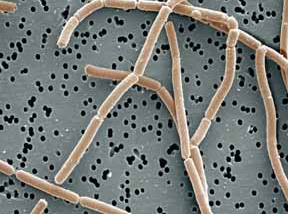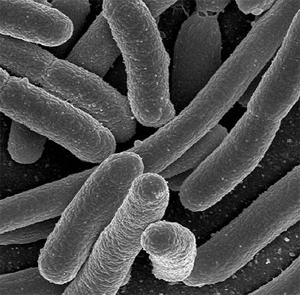Lactobacillus is a bacterium that can digest lactose. It converts lactose and other sugars into lactic acid. Many studies have shown that lactic acid bacteria have the ability to inhibit the growth of Helicobacter pylori, a pathogen that can cause Type B gastritis, peptic ulcers, and gastric cancer. Lactobacillus has also proven to treat and prevent diarrhea in children. Other potential benefits of this bacterium is the prevention of colon cancer, lowering cholesterol and blood pressure, and inflammation reduction.

View of Lactobacillus bulgaricus (http://microbewiki.kenyon.edu/index.php/Lactobacillus)
Escherichia Coli
Normally found in the lower intestine of warm-blooded animals, e. coli is known to benefit their hosts by producing vitamin K2 and preventing the establishment of pathogenic bacteria in the intestine. E. Coli strains are relatively harmless but there are some forms that can cause food poisoning in humans. This bacterium is also used in drugs produced to treat and cure illnesses. These drugs include synthetic insulin or antibiotics.

E. Coli Specimen (http://www.freedrinkingwater.com/water-contamination/ecoli-bacteria-removal-water.htm)
Nitrosomonas
Nitrosomonas is an obligate chemolithotrophic bacterium. It is normally found in areas of sewage, soil, fresh water, and marine ecosystems. It functions as a nitrifying bacterium that oxidizes ammonia into nitrate. Nitrosomonas are very useful in the treatment of industrial and sewage waste with the process of bioremediation. Their absence can cause a huge disruption in the nitrogen cycle and the process of carbon fixation.

Stained sample of Nitrosomonas (http://filebox.vt.edu/users/chagedor/biol_4684/Microbes/nitro.html)
No comments:
Post a Comment